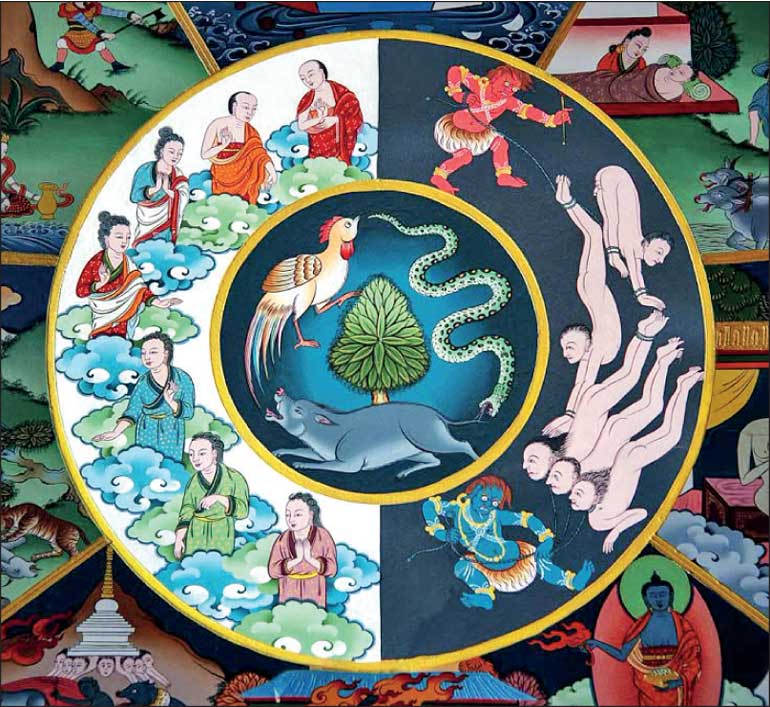Tuesday Feb 17, 2026
Tuesday Feb 17, 2026
Saturday, 11 October 2025 00:02 - - {{hitsCtrl.values.hits}}

The presence or absence of karma is not determined by the action itself but by the mental state from which the action originates
By Rohana Ulluwishewa
Karma is one of the most widely discussed concepts in spiritual traditions, yet it is often misunderstood. Conventionally, people see karma as a system of cosmic reward and punishment: good actions bring good results, and bad actions bring suffering. While this interpretation helps people accept life’s adversities without resentment, it misses the deeper transformative potential of karma. A closer look reveals that karma is less about external events and more about the source of our intentions and the inner consequences they produce. This article explores how the origin of intention, whether from separateness or oneness, shapes our experiences, determines whether karma arises, and opens the door for inner transformation and sustainable living.
Whether an action produces karma depends on the source of its intention; whether the intention comes from separateness or oneness.
The role of intention
Intentions from separateness: When intentions arise from a sense of separateness—the “I” versus “others” or “I” versus “the world” perspective, actions inevitably lead to karma. The consequences may manifest as disturbances within: stress, anger, anxiety, or inner disharmony. These consequences serve as signals, pointing to the need for self-reflection and transformation.
Intentions from oneness: When intentions arise from oneness, a state free from ego, desires, and aversions, actions flow naturally without creating karma. These actions strengthen inner peace, harmony, and joy, benefiting both the self and others. Thus, the presence or absence of karma is not determined by the action itself but by the mental state from which the action originates.
The role of self-observation
Through non-judgmental observation of thoughts and emotions, one can see where intentions originate. This process reveals two distinct patterns: (1) When intentions arise from separateness, the result is inner turbulence and suffering. (2) When intentions arise from oneness, the result is inner peace, harmony, and joy. Self-observation, introspection, journaling, coaching, and retrospection help us trace our mental disturbances back to their roots in separateness, enabling a conscious shift toward oneness.
Conventional beliefs and missed opportunities
Traditional beliefs about karma often fall into three common scenarios:
Attributing adversity to karma: When something undesirable happens, people often say, “This is my karma.” This perspective prevents reactive behaviour toward others, helping preserve peace and relationships. However, it may overlook the chance to see separateness as the deeper root cause.
Rejecting karma and reacting: When people dismiss karma altogether, they often react against the perceived source of suffering, disturbing both inner peace and outer harmony.
A third scenario involves carelessness or unmindful actions being attributed to karma. While this offers self-consolation, it prevents people from recognising the need for mindfulness to avoid similar mistakes in the future.
In all three cases, the transformative opportunity to move from separateness to oneness is missed.
Karma as a positive force for transformation
This deeper understanding reframes karma as a teacher rather than a punisher. Every disturbance: stress, sadness, anger, anxiety, signals that our intentions arose from the wrong source: separateness. When we heed this signal, we can consciously shift toward oneness, transcending self-centeredness and embracing whole-centeredness.
As this shift unfolds, actions naturally align with the principles of peace, harmony, compassion, and sustainability, reflecting the interconnectedness of all life.
Conclusion
Karma, in its deeper sense, is not about fate or destiny but about feedback from life. Every consequence, whether pleasant or unpleasant, is a signal pointing us toward self-awareness and transformation. By observing our thoughts, emotions, and intentions non-judgmentally, we can see whether they arise from separateness or oneness.
When intentions originate from separateness, life presents disturbances as opportunities for inner growth. When intentions arise from oneness, actions naturally align with peace, harmony, and sustainability, freeing us from the cycle of suffering. Thus, karma becomes a pathway to inner freedom and a guide toward living in harmony with ourselves, others, and nature.